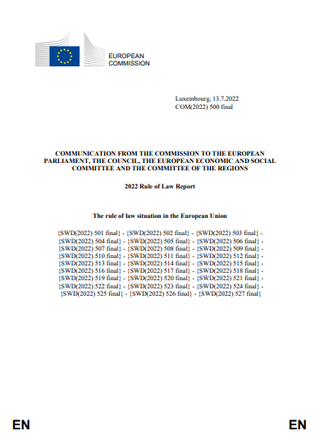
The Rule of Law Report monitors significant developments across EU Member States in four key areas: the justice system, the anti-corruption framework, media pluralism and media freedom, and other institutional issues related to checks and balances. The 2022 report covers for the first time new topics such as public service media and the implementation of judgements of the European Court of Human Rights.
The biggest new feature of this edition is the inclusion of country-specific recommendations , as announced by President von der Leyen in the 2021 State of the Union address. The recommendations aim to assist Member States in taking forward reforms and identifying areas where improvements are needed, with a view to address systemic challenges. The 2023 edition will assess the implementation of the recommendations.
The 2022 Rule of Law Report shows that important reforms took place in many EU countries, but important concerns remain in others. A closer look at the media pluralism and media freedom area reveals that:
- All Member States have legislation in place setting out the competences and independence of media regulators. However, in some countries such as Hungary and Slovenia, concerns persist about the functional independence of regulators.
- New legislation enhancing transparency of media ownership has been adopted in Croatia, Cyprus, Estonia, Greece, Lithuania, Poland, Portugal and Spain, while such laws are being considered in Bulgaria and Slovakia. Challenges in this domain remain in Czechia, the Netherlands, France and Slovenia.
- While issues remain in several Member States, developments in a few others (Croatia, Malta and Cyprus) address concerns about the transparency of state advertising.
- All Member States have legislative and institutional systems to regulate public service media. However, concerns related to the risk of politicisation of appointments and dismissals of managers and board members remain in Czechia, Slovakia and Cyprus; PSM independence is at risk in Malta, Slovenia and Poland; in Greece, while the legal framework is strong, there are concerns with regards to potential political influence in the appointment of board members; in Hungary, PSM operates in a complex institutional system amidst concerns about editorial independence.
- Positive developments to ensure the right of access to information have been registered in the Netherlands, Finland, Spain and Denmark. Practical or legal concerns remain in Belgium, Lithuania, Austria, Malta and Hungary.
- Journalists continue to face threats and attacks. Some EU countries (France, the Netherlands, Germany and Greece) have taken or stepped up existing measures to improve their safety. In other Member States (Croatia, Slovenia and Slovakia), more determined efforts would be needed. Criminal trials continue in the cases of journalists murdered in Malta, Slovakia and the Netherlands, while the murder of journalist Giorgios Karaivaz is under investigation in Greece.
- In Lithuania, Ireland, Malta and Italy debates and reviews of legislative provisions for the introduction of safeguards against SLAPPs have started. However, the increasing prevalence of SLAPP cases raises concerns in Italy, while amendments to reduce the punishment for defamation are still pending in Slovakia. In Croatia, the number of cases of abusive litigation targeting journalists remains high. In Poland, the news media community continues to be exposed to legal threats.
The content of this article can be used according to the terms of Creative Commons: Attribution-NonCommercial 4.0 International (CC BY-NC 4.0) . To do so use the the wording "this article was originally published on the Resource Centre on Media Freedom in Europe" including a direct active link to the original article page.

